Flipping for physics
 Don’t shake it off. Shake it up. After seven years as chief information officer, professor Rick Matthews found flipping his introductory physics course inspired first-year students and his popular teaching style in new ways.
Don’t shake it off. Shake it up. After seven years as chief information officer, professor Rick Matthews found flipping his introductory physics course inspired first-year students and his popular teaching style in new ways.
 Don’t shake it off. Shake it up. After seven years as chief information officer, professor Rick Matthews found flipping his introductory physics course inspired first-year students and his popular teaching style in new ways.
Don’t shake it off. Shake it up. After seven years as chief information officer, professor Rick Matthews found flipping his introductory physics course inspired first-year students and his popular teaching style in new ways.
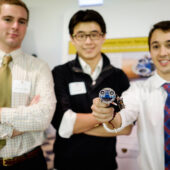 From bats to blue-footed boobies and beyond, 2014 was a memorable year for Wake Forest when it came to science and technology news.
From bats to blue-footed boobies and beyond, 2014 was a memorable year for Wake Forest when it came to science and technology news.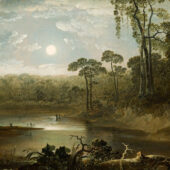 History professor Michele Gillespie usually includes class visits to view art in Winston-Salem. This semester, she expanded the idea to benefit both the students in her Women and Gender in Early America course and the local museums.
History professor Michele Gillespie usually includes class visits to view art in Winston-Salem. This semester, she expanded the idea to benefit both the students in her Women and Gender in Early America course and the local museums.Categories: Arts & Culture, Experiential Learning, Mentorship, Research & Discovery
 The ZieSta Room encourages the wellbeing of students by having a specified place within the library that allows students to easily take a break from work.
The ZieSta Room encourages the wellbeing of students by having a specified place within the library that allows students to easily take a break from work.Categories: Campus Life, Experiential Learning, Research & Discovery, Wellbeing
 A popular first-year seminar in English gives students opportunity to use a pop singer’s life and music as a kaleidoscope to look at topics like body image, privacy and feminism.
A popular first-year seminar in English gives students opportunity to use a pop singer’s life and music as a kaleidoscope to look at topics like body image, privacy and feminism. Categories: Experiential Learning, Research & Discovery
 Schoolchildren visiting SciWorks science museum learn hands-on about alternative fuels like hydrogen with help from associate professor of physics Timo Thonhauser.
Schoolchildren visiting SciWorks science museum learn hands-on about alternative fuels like hydrogen with help from associate professor of physics Timo Thonhauser.Categories: Research & Discovery
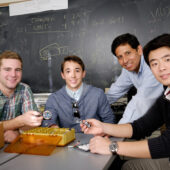 STEM incubator brings students from different classes and disciplines together, fostering horizontal relationships where they learn from each other, but also vertical relationships with their faculty mentors.
STEM incubator brings students from different classes and disciplines together, fostering horizontal relationships where they learn from each other, but also vertical relationships with their faculty mentors.Categories: Research & Discovery, University Announcements
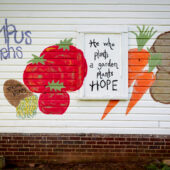 Justice. Politics. Access. Quality. Insecurity. Production. Deserts. Sustainability. One word that connects all of these words is FOOD. At Wake Forest, references to these terms – food justice, food quality, food politics – can be found everywhere, woven into the fabric of students’ lives through their course work, extra-curricular activities and service learning opportunities.
Justice. Politics. Access. Quality. Insecurity. Production. Deserts. Sustainability. One word that connects all of these words is FOOD. At Wake Forest, references to these terms – food justice, food quality, food politics – can be found everywhere, woven into the fabric of students’ lives through their course work, extra-curricular activities and service learning opportunities.Categories: Campus Life, Environment & Sustainability, Experiential Learning, Happening at Wake, Research & Discovery, University Announcements
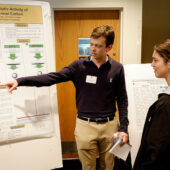 Research Day is a highlight of the academic year, showcasing the personal interaction and intellectual exchange between students and faculty.
Research Day is a highlight of the academic year, showcasing the personal interaction and intellectual exchange between students and faculty.Categories: Experiential Learning, Happening at Wake, Mentorship, Research & Discovery